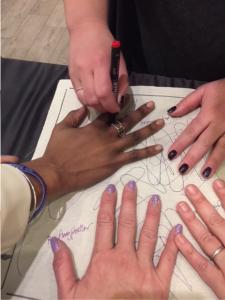It’s been 15 years since Fred Rogers died. To be honest, I never really knew him as “Fred;” he was always Mr. Rogers to me and probably to a lot of you.
I remember thinking as a child that Mr. Rogers was a little strange—he wore some ugly sweaters and played with puppets on TV, after all. But, of course had I known he was a minister, Rev. Fred Rogers, that would have made all the sense in the world. Still, he was a calm, lovely presence on television, “a man who ironed clothes, played with puppets, and sang songs about feelings,” and his theme song about neighbors could stick in your head all day long. Won’t you be my neighbor?
Mr. Rogers talked and taught about neighboring, about being a welcoming presence to all of our neighbors, no matter who they were. He was talking about beloved community, the kind of community that can change the world.
I don’t know about you, but I am finding it harder and harder to feel optimistic about the state of the world. There seems to be so much going wrong—a government in crisis, a gun violence epidemic spiraling out of control, and fear—so much fear about what will happen to me, to my Black daughter, to my immigrant and LGBTQ friends, to the world. But I know—I know in my heart, and you do, too—that the most fundamental change comes, not from big shifts in policy or even a change in Congress. The most impactful change to our world starts with being a good neighbor.
Tonight we remember the night Jesus gathered his disciples around the table for Passover dinner and tried to sum up everything he’d been teaching them for three long years. I’m pretty sure he wasn’t wearing a cardigan sweater, but he was giving them the same message about neighboring. The most important thing, Jesus said that night, was to love. To love each other. To cross the lines that divide us and the fear the looks like a huge, impenetrable wall, and to issue an invitation, with love: won’t you be my neighbor?
The thing is, while a great idea in theory, neighboring in the true sense of the word is hard, slogging, frustrating work. My friend Travis Norvell says it like this: “My abstract love works if I keep my definition of neighbor amorphous and undefined. Once I identify my neighbor, however, as in-the-flesh actual human beings with names and faces and stories, then my practice of abstract love falls apart.”
And that is exactly where Jesus and his followers found themselves that night. If you can, close your eyes and imagine the scene around the table that night. There at the table with Jesus was a rag tag group of friends who had been through so much together. They’d worked so hard to support and follow Jesus, to teach this message of love he was trying to share with the world, but there they were looking at each other across the table. Individuals. Tension in the air with James and John vying for places of honor next to Jesus, Judas plotting to betray as soon as dinner was over, and Peter doing God knows what but certainly annoying everyone around him.
Being neighbors to each other was hard; they knew that well. They had discovered along the way that they held radically different ideas about faith. Some of them had personalities that drove everybody crazy. Some of them were untrustworthy, trying to dismantle the little community that Jesus had begun. Some of them were there for the wrong reasons altogether. Still, Jesus invited them to the table. He washed their feet, like a servant would. He fed them bread and wine that would nourish their bodies for the rough road ahead. He modeled the excruciatingly difficult work of being a good neighbor, and then he asked them to do the same exact thing. Love your neighbor.
Tonight we’ll share communion in small groups gathered around these tables together, and we’ll serve each other in memory of that meal we’re reading about tonight. And as we do we’ll be invited to be a neighbor, to show love to one another, everyone invited to come.
And as we do we may feel so many things. We’ll notice some people missing from the table. We might even feel a little fear or anxiety about what the days, months, year ahead might hold for us and for those around this table. We may gather around this table we’ll feel discomfort. We’ll glance up at each other and realize there are some people around this table we hardly know at all because we don’t always take the time we should to know our neighbors. There may even be some faces around the table that make us feel a little (or a lot) of dislike, impatience or annoyance. Still, we gather to serve one another and to walk into the days ahead together because of what Jesus told us to do when he invited us to his table.
Overcome the fear that divides you from each other and love. Love your neighbor.
 In 1969, Fred Rogers taped a groundbreaking episode of Mr. Roger’s Neighborhood. On the set it was a hot day in the neighborhood, and Mr. Rogers had taken off his socks and shoes and was cooling off his feet in a plastic pool full of water. Who happened to walk by but Officer Clemons, the neighborhood’s friendly police officer played by François Clemons. Officer Clemons was the first recurring Black character in a children’s television program. And Mr. Rogers invited Officer Clemons to join him, to cool his feet in the pool.
In 1969, Fred Rogers taped a groundbreaking episode of Mr. Roger’s Neighborhood. On the set it was a hot day in the neighborhood, and Mr. Rogers had taken off his socks and shoes and was cooling off his feet in a plastic pool full of water. Who happened to walk by but Officer Clemons, the neighborhood’s friendly police officer played by François Clemons. Officer Clemons was the first recurring Black character in a children’s television program. And Mr. Rogers invited Officer Clemons to join him, to cool his feet in the pool.
This invitation on public television happened, of course, only one year after the assassination of Martin Luther King, Jr., when racial tensions in America were resulting in riots and protests, so much violence. In fact, this episode came only five years after the St. Augustine “wade in,” where protesters tried to integrate a pool at a Florida motel, the Monson Motor Lodge. The motel’s manager poured acid into the water of the pool, trying to get the protesters out. Hearing about that incident again is enough to make you despair for the state of the world.
But then, there was Mr. Rogers, soaking his feet in a pool of water and extending an invitation to Officer Clemons: “Would you like to join me?” Children all over this country watched as two pairs of feet—one white and one brown—splashed next to each other in the little wading pool. As they sat, they talked about what it meant to express love. And when it was time to put their shoes back on, they helped each other, drying off each others’ feet, showing love and care for each other. By extending that simple invitation and getting in the pool, Mr. Rogers and Officer Clemons made a statement to the whole world about how it is we love our neighbors, a radical statement, framed by an invitation. This is what Jesus is asking of us, too.
Welcome to the table of Christ. Come and gather around this table and bring all of the hope, pain, love, uncertainty, fear and anger that you carry. We’ll serve each other and then we’ll head out into these next few days nourished by the knowledge that we’ve come to the table together and served each another a serving of grace and courage, that we have begun again the work of healing the world, one neighbor at a time.
Amen.
















